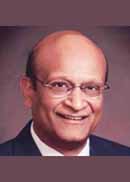Vijaya Raghavan
Vijaya Raghavan, PhD,
Professor,
Department of Bioresource Engineering,
McGill University,
Ste-Anne-de-Bellevue, QC,
CANADA.
Dr. Vijaya Raghavan obtained his B. Eng. (Mech. Eng.) from Bangalore University, India in 1967, his M.Sc. (Agr. Eng.) from the University of Guelph in 1970, and his Ph.D. (Agr. Eng.) in 1973 from Colorado State University. Dr. Raghavan’s career at McGill started in 1974 as a Research Associate and Lecturer at the Department of Agricultural Engineering at Macdonald Campus. He became an Assistant Professor in 1977, an Associate Professor in 1983, and a Full Professor in 1987. He was Chair of the Department from 1993 to 2003, and has been the recipient of a James McGill Professor award since 2002. He was director of four CIDA-funded projects administered by the AUCC through their UPCD program. Three projects dealt with the transfer of expertise and post-harvest technologies to southern India for the consolidation of food security in this region. The fourth project was the transfer of expertise and electro-technologies to China for the purposes of research in food processing and for other applications such as the extraction of valued chemicals from plant materials, and the synthesis of chemicals. Teaching is an important part of Dr. Raghavan’s activities, both at the undergraduate and graduate levels. In his courses, he seeks to engage and motivate his students with enthusiasm, with hands-on experience in labs, and with concrete examples in field trips to actual installations showing engineering principles in action. To date, he has mentored over 180 undergraduate students through their capstone project course, and has supervised 64 M.Sc. students and 37 Ph.D. candidates to completion of their degrees.
Research Interests
The main thrust of Dr Raghavan’s research efforts over the last two decades has been to study and develop post-harvest or post-production processes and technologies for the drying and storage of produce and crops. Initial studies were on the use of particulate medium for heat treatment and drying of grains in spouted, fluidized and packed beds. His focus has shifted to the dielectric heating of produce and foods with electro-technologies based on the use of microwaves (MW), radio-frequency (RF), and pulsed-electric fields (PEF). Conventional drying systems operate on the classic thermodynamic concepts of heat and mass transfer. With MW and RF, heat is generated volumetrically within the produce as a result of the material’s dielectric properties. Also, the structure, size, and shape of the produce are important factors affecting the use of electro-technology. The systems are thus more complex, and one of Dr Raghavan’s on-going endeavors is to find the bridge between the heating and drying described by classic thermodynamics equations with those describing the dielectric behavior of the material when exposed to MW and RF. Dr Raghavan’s research activities have also touched on other areas such as soil compaction and tillage practices, controlled and modified atmosphere storage of produce, hyper-baric treatment of produce prior to storage, distribution of heat in heat-treatment of produce, microwave-assisted extraction of bioactive compounds from plant materials, disinfestation of grains in storage using ultra-high frequency microwaves, electro-osmotic dewatering, characterization of a double-pipe helical heat exchanger, microwave-assisted retting of flax and hemp for production of biofibers, microwave pasteurization of in-shell eggs, production and usage of biochar, generation of electric energy by microbial fuel cells, and carbon capture from gas emissions by photosynthetic microorganisms.
Current Research
High electric field drying and processing of thermosensitive food products
High pressure pre-treatment for extending shelf life of produce without refrigeration
Energy from microbial fuel cells using organic waste as a carbon source
Microwave-assisted production of biochar and hydrochar from different biomasses
Physicochemical properties of biochar and effect on soil properties; and (vi) Microwave assisted retting of flax and hemp straws.

